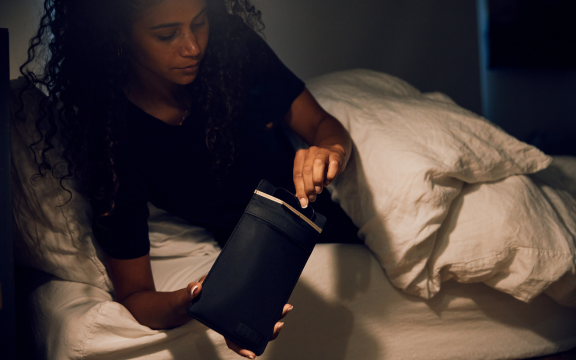Shop
Tips to fall asleep without your phone - how your phone affects your sleep

Did you know that more than 80% of Americans are proud owners of smartphones? And here's an eye-opening statistic: around 65% of smartphone users confess to indulging in a late-night phone check.
While browsing through your phone before bed may appear harmless, it might be wreaking havoc on your sleep patterns, making it difficult to both fall asleep and stay asleep.
It's important to be aware of the potential consequences of this seemingly innocent activity.
In this blog post, we'll unravel the impact your phone has on your beauty sleep say goodbye to phone-induced insomnia and hello to restful nights.
- Why do devices keep us up?" href="#b-data-mce-fragment-1-why-do-devices-keep-us-up-b">Why do devices keep us up?
- Practical Strategies for Navigating Technology for Better Sleep" href="#b-data-mce-fragment-1-practical-strategies-for-navigating-technology-for-better-sleep-b">Practical Strategies for Navigating Technology for Better Sleep
- Conclusion" href="#b-data-mce-fragment-1-conclusion-b">Conclusion
Why do devices keep us up?
Our daily 24-hour sleep-wake routine is dictated by our internal biological clock, as highlighted by the National Institute of Neurological Disorders and Stroke (NINDS)
As the day breaches, your body releases cortisol, a hormone that kickstarts your alertness. Conversely, as daylight dwindles, another hormone, melatonin, takes the stage, lulling you into a state of sleepiness.
Our modern companions, and electronic back-lit devices like smartphones, tablets, and computers produce short-wavelength enriched light, described as blue light. Even our artificial indoor lighting, like fluorescent and LED lights, sheds this blue light.
The after-dark exposure to blue light can interfere with melatonin production, pulling down the curtains on feelings of sleepiness. Furthermore, blue light can chisel away at your slow-wave and rapid-eye-movement (REM) sleep stages — essential for our mental functioning.
Even specific varieties of household lighting can pose a hurdle to nighttime melatonin synthesis, according to the National Library of Medicine, Biotech Information. One illuminating study revealed that a brightly lit bedroom could potentially stall melatonin production by an astounding 90 minutes when compared to dimly lit surroundings.
On the flip side, red, yellow, and orange lights appear to have minimal interference with the rhythm of your circadian clock. Hence, dim lights with these more soothing hues are ideal for your bedtime reading ritual. Certain e-readers, like Kindle or Kobo, release less blue light than other electronic devices. To maintain your sleep hygiene, it's advisable to keep their display settings dimmed to the greatest extent possible and use the nighttime setting if applicable.
“The big problem with light exposure that we get from electronics is that it is delaying what our brain interprets as sunset,” said Dr. Charles Czeisler, a sleep doctor at Harvard Medical School. According to his explanation, the blue light emitted by our screens sends a signal to our brains, tricking them into thinking it's still daytime. This signal then boosts our energy levels and prevents the release of melatonin, the hormone that induces sleepiness.
The Dangers of Dopamine Depletion
Late-night gaming sessions or social media scrolling can cause dopamine (a neurotransmitter linked to pleasure and reward) to deplete. When this “feel good” chemical runs low, it can make falling asleep and staying asleep a daunting task, leaving behind restless nights and drowsy days.
Keeping Our Phone Within Sight
Potentially the most significant adversary to a good night's sleep is the ever-present smartphone — especially when it's within your line of sight. The allure of that tiny screen is difficult to resist, creating a welcome invitation for mindless browsing. This seemingly innocent activity stimulates your mind when it should be unwinding
Subconscious Phone-Checking Habits
Like a siren call in the dead of night, your phone lures your hand to it, waking your brain and keeping you up longer than you need to be. Subconsciously reaching for your phone in the night can lead to a disrupted and restless sleep, making mornings grumpier than they need to be.
The Deceptive Lure of Software Adjustments
Adjusting brightness levels or setting 'Do Not Disturb' measures often do little to stave off the sleep disruption when your phone is nearby. The average smartphone takes just seconds to turn on—hardly a deterrent for those midnight scrolls—and let’s face it, nearly nobody turns their devices off entirely.
The Human-Phone Tug of War
Smartphones and their various software are designed to capture your attention and hook your brain. So, if constant notifications, vibrant colors, and endless scrolling feel like a digital tug of war, that's because it's by design. Your brain is on one side, and the relentless drive for engagement is on the other.
The Impact of Blue Light
The silent culprit disturbing your peaceful slumber could very well be the blue light emitted from your devices. This seemingly harmless glow can disturb your circadian rhythm, tricking your body into believing it is still daytime, causing chaos with your sleep hormones, and disrupting your natural sleep cycle.
The Need for Screen-Free Time Before Bed
It's not just about breaking up with your phone – it's about creating distance from all screens. Televisions, tablets, and computers need to be shown the bedroom door too. Dedicating time away from screens before bed can help your brain unwind, setting you up for a good night's sleep and a refreshed tomorrow.
Practical Strategies for Navigating Technology for Better Sleep
Ever wondered how to increase your odds of obtaining that elusive good night's sleep? Here are a few helpful and innovative tips to help you rein in your tech habits and ultimately enhance your sleep health:
Turn Off Screens Pre-Bedtime
Make it a rule to switch off all screens, including televisions, phones, and computers, an hour before bedtime. Substitute your digital reading with a traditional print book to avoid the stimulating effects of screen light.
Set Up an Overnight Charging Station
Keep your devices powered up overnight in a different room. By doing so, you can avoid the temptation of having them within arm's reach on your bedside table.
Invest in a Traditional Alarm Clock
It is much more beneficial to use an alarm clock that won't disrupt your sleep, compared to your phone, which might awaken you at inconvenient hours.
Try Screen-Inverting Apps
Should turning off tech completely be unfeasible for you, consider using an app that inverts your screen's display—white letters on a black background. This softens the light emitted from the screen, making it less likely to disrupt your sleep. You could also invest in an e-reader which can dramatically reduce blue light and has nighttime settings for those late-night reading sessions.
Instill Good Practices Early On
A shocking 75% of children have at least one electronic device in their bedroom during sleep, according to the National Sleep Foundation. Establish a screen-free bedtime routine for your children to encourage healthier sleep habits.
Consider Blue Light blue-blocking glasses
Finally, it might be worth considering the purchase of "Blue Blockers" or orange-tinted glasses designed to filter blue Light emissions. If you don’t mind donning glasses, these can be very practical and effective, as confirmed by several studies. They are relatively inexpensive, usually costing less than $100, making them a feasibly beneficial investment for your sleep health.
Faraday Bags
Often overlooked in the conversation about sleep hygiene, the Faraday bag is designed to block all electronic signals, including the potentially disruptive electromagnetic field radiation (EMF). There's growing interest in the potential link between EMF and sleep disturbances. The body's pineal gland might interpret EMF radiation as light, potentially affecting melatonin production, a hormone crucial for sleep. Furthermore, a study published in the National Center for Biotechnology Information found that EMF exposure significantly altered sleep patterns in rats. Another research on Taylor & Francis Online indicated that power plant workers exposed to ELF-EMF experienced poorer sleep quality and more severe depression compared to those unexposed.
By blocking these signals, the Faraday bag not only prevents interruptions from unexpected calls and notifications but also shields you from EMF radiation that might disturb your sleep. It's like magically hitting the off-switch on all your devices without actually having to do so. Just tuck your devices snugly into the Faraday bag at bedtime, and you've set the stage for an undisturbed, serene night's sleep. This simple yet effective tool could be your secret to mastering the art of balancing technology with a good night's rest."
It's vital to note the cost of staying up late can be counterproductive. An interesting conundrum is that in America, even though many individuals extend their hours into the night to boost productivity, ironically, lack of sleep contributes to a more challenging next day. For instance, among those aged over 30, 75% report that insufficient sleep negatively impacts their work, according to data from the National Sleep Foundation.
Conclusion
It's time to reclaim your restful nights from the digital grip. Equipped with these realities, you can now make informed decisions about your pre-bedtime habits. Remember, it's not a goodbye to technology, but rather a healthier embrace of it. Good night, and good luck!
Overall, the main goal is to enjoy relatively tech-free evenings and to encourage better sleep habits. By understanding our devices' impacts and making simple changes, we can all look forward to more restful nights and productive days.
Recent Articles
Newsletter
Join Our Community: Privacy, Security, Health Updates
